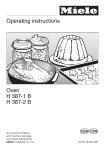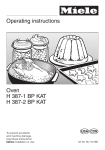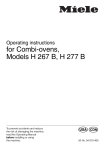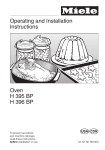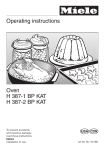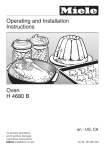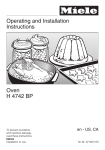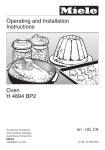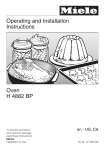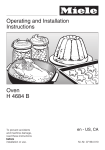Download Miele H 350-2 B Operating instructions
Transcript
Operating instructions
Oven
H 350-2 B
To prevent accidents
and machine damage,
read these instructions
before installation or use.
UV
M.-Nr. 05 808 660
Contents
IMPORTANT SAFETY INSTRUCTIONS
Guide to the oven
Accessories . . . . . . . . . . . . . . . . . . . . . . . . . . . . . . . . . . . . . . . . . . . . . . . . . . . . . . . 9
Roasting pan and Anti-splash tray . . . . . . . . . . . . . . . . . . . . . . . . . . . . . . . . . . . 9
Wire rack. . . . . . . . . . . . . . . . . . . . . . . . . . . . . . . . . . . . . . . . . . . . . . . . . . . . . . . 9
Baking Trays . . . . . . . . . . . . . . . . . . . . . . . . . . . . . . . . . . . . . . . . . . . . . . . . . . . . 9
Grease filter . . . . . . . . . . . . . . . . . . . . . . . . . . . . . . . . . . . . . . . . . . . . . . . . . . . 10
Roast probe . . . . . . . . . . . . . . . . . . . . . . . . . . . . . . . . . . . . . . . . . . . . . . . . . . . 10
Controls . . . . . . . . . . . . . . . . . . . . . . . . . . . . . . . . . . . . . . . . . . . . . . . . . . . . . . . . . 11
Energy-Conservation feature . . . . . . . . . . . . . . . . . . . . . . . . . . . . . . . . . . . . . . . . . 12
Before using for the first time
Using the oven
Interrupting cooking / turning off the oven. . . . . . . . . . . . . . . . . . . . . . . . . . . . . . . 14
Adjusting the default temperature . . . . . . . . . . . . . . . . . . . . . . . . . . . . . . . . . . . . . 15
Entering a cooking time . . . . . . . . . . . . . . . . . . . . . . . . . . . . . . . . . . . . . . . . . . . . . 16
Checking, changing and deleting a cooking time. . . . . . . . . . . . . . . . . . . . . . . . . 16
Rapid heat . . . . . . . . . . . . . . . . . . . . . . . . . . . . . . . . . . . . . . . . . . . . . . . . . . . . . . . 17
To turn off "rapid heat". . . . . . . . . . . . . . . . . . . . . . . . . . . . . . . . . . . . . . . . . . . . 17
Customizing a temperature setting . . . . . . . . . . . . . . . . . . . . . . . . . . . . . . . . . . . . 18
Setting the timer
Guide to the programs
Baking
Roasting
Roasting tips . . . . . . . . . . . . . . . . . . . . . . . . . . . . . . . . . . . . . . . . . . . . . . . . . . . . . 26
Using the roast probe
Roasting Recommendations
Broiling
Broiling tips . . . . . . . . . . . . . . . . . . . . . . . . . . . . . . . . . . . . . . . . . . . . . . . . . . . . . . 33
Broiling Recommendations
Defrost
Defrosting tips . . . . . . . . . . . . . . . . . . . . . . . . . . . . . . . . . . . . . . . . . . . . . . . . . . . . 35
2
Contents
Cleaning and care
PerfectClean . . . . . . . . . . . . . . . . . . . . . . . . . . . . . . . . . . . . . . . . . . . . . . . . . . . . . 37
Catalytic liners . . . . . . . . . . . . . . . . . . . . . . . . . . . . . . . . . . . . . . . . . . . . . . . . . . . . 38
Removing the oven door. . . . . . . . . . . . . . . . . . . . . . . . . . . . . . . . . . . . . . . . . . 40
Removing the runners. . . . . . . . . . . . . . . . . . . . . . . . . . . . . . . . . . . . . . . . . . . . 41
Removing the back panel. . . . . . . . . . . . . . . . . . . . . . . . . . . . . . . . . . . . . . . . . 41
Lowering the upper heating element . . . . . . . . . . . . . . . . . . . . . . . . . . . . . . . . 42
Removing the safety guard. . . . . . . . . . . . . . . . . . . . . . . . . . . . . . . . . . . . . . . . 42
Changing the light bulb
Turning additional features on or off
Frequently asked questions
After sales service
Optional accessories
Installation instructions
Caring for the environment
Disposal of the packing materials . . . . . . . . . . . . . . . . . . . . . . . . . . . . . . . . . . . . . 52
Disposal of an old appliance . . . . . . . . . . . . . . . . . . . . . . . . . . . . . . . . . . . . . . . . . 52
Electrical connection
Installing the oven
3
IMPORTANT SAFETY INSTRUCTIONS
Installation
This appliance is intended for
residential use only.
Only use the appliance for its
intended purpose. The manufacturer
cannot be held responsible for
damages caused by improper use
of this oven.
This appliance complies with current
safety requirements. Improper use of
the appliance can lead to personal
injury and material damage.
Read all instructions before installing
or using the oven for the first time.
Keep these operating instructions in
a safe place and pass them on to
any future user.
Before installation, make sure that
the voltage and frequency listed on
the data plate correspond with the
household electrical supply. This data
must correspond to prevent injury and
machine damage. Consult a qualified
electrician if in doubt.
Be certain your appliance is
properly installed and grounded by
a qualified technician.
To guarantee the electrical safety of this
appliance, continuity must exist
between the appliance and an effective
grounding system. It is imperative that
this basic safety requirement be met. If
there is any doubt, have the electrical
system of the house checked by a
qualified electrician.
The manufacturer cannot be held
responsible for damages caused by the
lack, or inadequacy, of an effective
grounding system or the failure to
adhere to national and local electrical
codes.
The oven should not be operated
until it has been properly installed
within cabinetry.
Installation, maintenance and
repair work should be performed
by an authorized service technician.
Work by unqualified persons could be
dangerous and may void the warranty.
Before installation or service,
disconnect the power supply to the
work area by "tripping" the circuit
breaker, or shutting off the main power.
4
IMPORTANT SAFETY INSTRUCTIONS
Oven use
,WARNING: Ovens can produce
high temperatures that can cause
burns.
Prevent children from touching the
appliance when in use.
Use heat-resistant pot holders
when placing items in the oven,
turning them, or removing them from
the oven. The upper heating element
and oven racks can become very hot
and cause burns.
To prevent burns, always place
oven racks at their desired height
while the oven is cool.
Always open the door carefully.
Allow hot air or steam to escape
before placing or removing food.
The door gasket is essential for a
good seal. Care should be taken
not to rub, damage or move the gasket.
The door gasket should only be
cleaned with a solution of warm water
and soap.
Do not block
oven vents.
Do not let metal objects (aluminum
foil, metal pans) or the roast probe
come in contact with the heating
element.
Do not slide pots or pans on the
oven floor. This could scratch and
damage the surface.
Do not lean, sit, or place heavy
items on the open oven door. The
door can support a maximum weight of
33 lbs (15 kg).
To prevent burns, allow the heating
element to cool before cleaning by
hand.
Only clean parts listed in this
manual.
Caution: Heating elements may be
hot even though they are not
glowing. During and after use, do not
let clothing or other flammable
materials come in contact with heating
elements or interior surfaces of the
oven until they have had sufficient time
to cool. External parts of the oven such
as the door glass, vents, and control
panel may also become hot.
5
IMPORTANT SAFETY INSTRUCTIONS
Do not heat unopened containers
of food in the oven, pressure may
build up and cause them to explode.
Never add water to food on a hot
tray or pan, or directly onto food in
a hot oven. The steam created could
cause serious burns or scalds and the
sudden change in temperature can
damage the enamel.
This oven must only be used for
cooking. Do not use it as a dryer,
kiln, dehumidifier, etc. Fumes or vapors
given off by glues, plastics or other
non-food items could ignite and cause
property damage or injury.
Cover all cooked food that is left in
the oven to be kept warm. This will
prevent moisture from condensing on
the interior of the oven. Long-term or
excessive condensation could damage
the oven.
6
Only use the Miele roast probe
supplied with the oven. Contact
Miele if you need to purchase a new
probe.
Remove the roast probe from the
oven when not using it. High
broiling temperatures may damage the
probe.
Never use aluminum foil to line the
oven floor. Do not place pots, pans
or baking sheets directly on the oven
floor when using "Surround", "Bottom
Heat" or "Intensive". This could crack
the enamel on the oven floor.
Never store flammable liquids and
materials in, above or under an
oven, or near cooking surfaces.
IMPORTANT SAFETY INSTRUCTIONS
General notes
Disposal of an old oven
Do not use a steam cleaner to
clean the oven. Steam could
penetrate electrical components and
cause a short circuit.
When discarding an old oven,
disconnect it from the power
supply and cut off the power cord.
Remove the door to prevent a trapping
hazard.
Children should not be left alone or
unattended in an area where an
oven is in use. Never allow children to
sit or stand on any part of the oven.
Caution: Do not store items of interest
to children in cabinets above an oven.
Children climbing on the oven to reach
these items may be injured.
Do not leave the oven unattended
when cooking with oils or fats, they
can be a fire hazard if overheated.
Do not use water on grease fires!
Smother the fire with a properly
rated dry chemical or foam fire
extinguisher.
Be aware of loose fitting or hanging
garments while operating the oven.
Do not use the oven to heat the
room.
Make certain that the power cords
of small appliances do not come in
contact with or get caught in the oven
door.
Use only dry, heat resistant
potholders. Moist or damp
potholders used on hot surfaces may
result in steam burns. Do not let
potholders come in contact with oils.
Do not substitute towels or other bulky
items for potholders.
7
Guide to the oven
a Program selector
g Roast probe socket
b Oven display
h Non-tip, five level runners
c Oven push buttons
i Door contact switch*
d +/– adjust buttons
j Oven door
e Upper heating element and
safety guard
f Convection fan
8
*This switch shuts off the heating
element and convection fan when the
door is opened during use.
Guide to the oven
Accessories
Roasting pan and Anti-splash tray
Wire rack
The roasting pan is ideal for catching
drippings from meat or poultry roasted
or broiled directly on the rack.
Baking Trays
It can also be used as a baking tray.
The anti-splash tray may be placed in
the roasting pan to reduce splattering
of drippings from meat or poultry.
The roasting pan and anti-splash tray
are coated with PerfectClean enamel
and can be easily cleaned with a
sponge and dish soap.
The oven comes equipped with two
baking trays. These trays are to be
placed in the runners on either side of
the oven rather than on the wire rack
itself.
Non-tip safety notches
The wire rack, roasting pan and baking
trays are equipped with non-tip safety
notches (see arrows) which prevent
them from being pulled out completely
while the oven is in use.
When inserting a rack, pan or tray
always check that the safety notches
are at the rear of the oven.
Once inserted into the oven these
pieces can only be removed by raising
the piece upwards and then pulling it
out.
9
Guide to the oven
Grease filter
The filter helps to keep the oven fan
clean from moisture and grease.
When roasting or broiling, insert the
grease filter in front of the fan opening.
10
Roast probe
The roast probe monitors the core
temperature of meat and poultry during
the roasting function.
The long pointed end of the probe is
inserted into the thickest portion of the
meat while the short end of the probe is
inserted into the roast probe socket.
Guide to the oven
Controls
The oven controls consist of the
program selector and push buttons.
All temperature and time selections are
made by using the "+" or "–" buttons.
To make changes one digit at a time
make short pushes on the button. For
rapid advancement hold the button in.
– oven temperatures are in 10°F/5°C
increments
The program selector can be turned
either way.
– core temperatures are in 2°F/1°C
increments
– timer in 1 minute increments
While the light between the "+" and "–"
buttons is on, times and temperatures
can be entered or changed.
When the light goes out your entry is
accepted.
Each push button has a matching
symbol in the oven display.
Button
controls:
symbol
Temp.
oven temperature
settings
p
Probe
core temperature
settings
e
Cook
cooking timer
g
11
Guide to the oven
Child Safety Lock
Energy-Conservation feature
The child safety lock can be activated
to prevent children from operating the
oven.
When using the "Cook" button or the
roasting probe, the residual heat of the
oven is automatically used to finish the
cooking process and conserve energy.
To activate the Child Safety Lock:
^ Make sure the program selector is in
the "0" (OFF) position.
^ Press the "Temp." button until the key
symbol appears in the display.
Once this symbol appears, the oven is
locked.
To deactivate the Child Safety Lock:
^ Press the "Temp." button until the key
symbol in the display disappears.
12
Shortly before the end of the cooking
process, the oven shuts off the heat.
The letters "EC" will appear in the
display.
The cooling fan will continue to run in
"EC", as well as the convection fan if a
"fan" function was chosen.
Before using for the first time
Heat the oven
New ovens may have a slight odor
during the first few uses. To eliminate
the odor quickly, the oven should be
operated at a high temperature for 2
hours.
Make sure the room is well ventilated
during this process.
^ Before heating the oven remove all
accessories, labels and protective
plastic films.
^ Use a soft cloth or sponge to wipe
out the oven interior using a solution
of warm water and a non-abrasive
detergent. Dry the interior with a soft
cloth.
^ Set the temperature to 480°F (250°C),
using the "+" button while the
indicator light between the "+" and "-"
buttons is lit.
^ Set the timer by pressing the "Cook"
button.
"0:00" will appear in the display and the
"+/-" indicator will light.
^ While the light between the "+/-"
buttons is lit, enter 2 hours using the
"+" button.
The oven will begin to heat as soon as
the indicator light between the "+/-"
buttons goes out.
^ Turn the program selector to
"Convection".
13
Using the oven
a Turn the program selector to the
desired program.
At the end of the cooking time:
A tone sounds for 5 seconds and the
"g" symbol flashes.
To turn off the tone and the flashing
symbol:
– press the "Cook" button.
– turn the program selector to "0".
Interrupting cooking / turning
off the oven
^ Turn the program selector to "0".
The oven will turn off, and all programs
will be canceled.
The default oven temperature, will
appear in the display and the indicator
between the "+/–" buttons will light.
The oven will start to heat as soon as
the indicator between the "+/–" buttons
goes out.
b Adjust the default temperature if
needed.
c Allow the oven to preheat if
necessary.
The rising oven temperature can be
monitored in the display.
d Place food in the oven.
e Enter the cooking time.
14
Exceptions:
If the roast probe is inserted in its
socket, the "e" symbol will remain lit.
Using the oven
Adjusting the default
temperature
^ Press the "Temp." button.
^ Using the "+/–" buttons enter the
desired temperature.
The default temperature of each
program, can be adjusted within the
range shown below:
Convection
90-480°F (30-250°C)
Auto Roast
210-440°F (100-230°C)
Top Heat
90-480°F (30-250°C)
Surround
90-510°F (30-280°C)
Bottom Heat
210-480°F (100-250°C)
Defrost
90-120°F (30-50°C)
Intensive
120-480°F (50-250°C)
Fan Broil
120-470°F (50-260°C)
Broil
390-570°F (200-300°C)
Maxi Broil
390-570°F (200-300°C)
15
Using the oven
Entering a cooking time
When a cooking time is entered the
oven will turn off automatically at the
end of the elapsed time.
Checking, changing and
deleting a cooking time
To check a cooking time
^ Press the "Cook" button.
^ Press the "Cook" button.
"0:00" will appear in the display and the
"+/–" indicator will light.
The remaining cooking time will appear
in the display.
To change a cooking time
^ Press the "Cook" button.
^ While the light between the "+/–"
buttons is lit, enter the cooking time
using the "+" button. A time from one
minute to 23 hours 59 minutes can be
entered.
^ Use the "+" or "–" buttons to enter the
new time.
The cooking process will begin as soon
as the indicator light between the "+/–"
buttons goes out.
When the indicator between the "+/–"
buttons goes out, the new time has
been entered.
This function is not available when
using the roast probe.
To delete a cooking time
^ Press the "Cook" button.
^ Use the "–" button to set the cooking
time to "0:00".
During a power failure, all entries will be
canceled.
16
Using the oven
Rapid heat
To turn off "rapid heat"
The rapid heat feature activates the
heating elements at maximum power to
heat the oven quickly. With the
"Convection", "Auto Roast" and
"Surround" programs, the "Rapid heat"
feature will activate automatically if the
selected temperature is:
For some dishes it may be desirable to
turn off "rapid heat" (cookies, small
cakes).
– at least 280°F (140°C) in
"Convection" or "Auto Roast".
or
– at least 300°F (150°C) in "Surround".
The rotating "F" ("C") beside the temperature display indicates that "rapid
heat" is on.
^ Select the oven program and
temperature.
As soon as the actual temperature
appears in the display, "rapid heat" can
be turned off.
^ Press the "–" button and hold until the
"F" ("C") in the display stops rotating.
Once the program selector has been
turned to "0", "Rapid heat" will be
available for the next use.
As soon as the desired temperature
has been reached, the additional
heating elements used during "rapid
heat" will turn off.
17
Using the oven
Customizing a temperature
setting
The default temperature of a program
can be changed if you frequently work
with temperatures that differ from the
factory settings (except "Defrost").
^ Turn the program selector to the
program that is to be given a different
temperature.
The default temperature will appear in
the display.
^ Use the "+" or "–" buttons to enter the
desired temperature.
^ To store the new temperature, press
the "Temp." button until a tone is
heard.
The new temperature will appear when
the program is selected.
In the event of a power failure, any
customized temperatures will be lost
and must be entered again.
18
Setting the timer
The timer can be used to time an
activity separate from the oven.
To cancel the timer
To set the timer
^ Turn the program selector to "0".
^ Press the "Cook" button.
^ Press the "Cook" button.
^ Use the "–" button to set the timer to
"0:00".
^ Enter the desired time in hours and
minutes (1 min. - 23 hrs. 59 mins.)
with the "+" button.
When the "+/–" indicator light goes out,
the time set starts counting down in
minutes.
If an oven program is selected the timer
will be canceled.
At the end of the timed period:
– a tone sounds for 5 seconds.
– the "g" symbol flashes for 1 minute.
The tone and the flashing symbol can
be canceled by pressing the "Cook"
button.
19
20
Guide to the programs
Baking
Convection
When using "Convection", several
runner levels can be used at the same
time.
The recommended positions are:
1 tray = 1st runner from the bottom
2 trays = 1st and 3rd runners
from the bottom
Default temperature . . . . 320°F (160°C)
This program actively circulates heated
air throughout the oven cavity for a
consistent baking temperature.
3 trays = 1st, 3rd and 5th runners
from the bottom
As a general rule, the cooking time of a
recipe not designed for baking in a
convection oven will be shorter.
Use this program for:
– cookies, cakes,
– soufflés, casseroles, quiche,
– frozen dinners,
– salmon, lobster tails,
– meat loaf, prime rib.
22
Remember to remove the grease filter
from the fan opening when baking
pastries. If the filter is not removed,
increase the baking time.
Baking
Intensive
Surround
Default temperature . . . . 340°F (170°C)
Default temperature . . . . 370°F (190°C)
The "Intensive" program generates heat
from the lower heating element. The
oven’s fan gently circulates the heated
air to create a brick oven environment.
The "Surround" program is a premium
conventional baking mode. The oven
heats with both the upper and lower
heating elements without the
convection fan.
Use this program for:
– baked potatoes, french fries,
– pizza, stromboli,
– brisket, pot roast,
– cheesecake, pies.
Use the 1st runner from the bottom.
Should the bottom of the food burn, try
raising the rack to a higher runner.
Use this program for:
– angel food cake,
– cream puffs,
– meringue.
The recommended positions are the
1st or 2nd runners from the bottom.
"Intensive" is not recommended for
roasting or shallow baking.
Since only the lower heating element
is used, bake only on one level. Do
not bake on the oven floor.
Remove the grease filter from the fan
opening. If the filter is not removed,
increase the baking time.
23
Baking
Top Heat
Bottom Heat
Default temperature . . . . 370°F (190°C)
Default temperature . . . . 370°F (190°C)
In the "Top heat" program, food is
heated from above.
The "Bottom heat" program works by
heating food from below. This is similar
to "bake" in a conventional oven.
Use this program for:
– browning meringue,
– melting a cheese topping,
– dense quick bread.
The recommended position is the 4th
runner from the bottom.
Use this program for:
– cakes,
– baked apples,
– quick breads,
– spare ribs.
The recommended positions are the 3rd
or 4th runners from the bottom.
24
Roasting
Auto Roast
Surround
Default temperature . . . . 320°F (160°C)
Default temperature . . . . 370°F (190°C)
This premium convection program
heats the oven to a high temperature to
sear the meat, and retain moisture and
tenderness.
"Surround" is a conventional roasting
program for traditional recipes.
Once the oven cavity temperature has
exceeded the set temperature, the
program returns to the selected
temperature.
Use this program for:
Use this program for:
– pot roast,
– leg of lamb,
– pork loin.
The recommended position is the 2nd
runner from the bottom.
– large cuts of meat,
– poultry.
The recommended position is the 3rd
runner from the bottom.
The oven should not be preheated
when using "Auto Roast".
25
Roasting
Roasting tips
Roasting in a covered pot L
– Always install the grease filter in the
back of the oven before roasting.
When roasting in a covered pot,
increase the recipe temperature by
70°F (20°C).
– The larger the cut of meat to be
roasted, the lower the temperature
that should be used.
The roasting process will take a little
longer, but the meat will be cooked
evenly and the outside will become
crisp.
– Use the roast probe for accurate
cooking temperatures and best
results.
Season the meat and place in the pot.
Add some butter, margarine or a little
oil. Add about ½ cup of water when
roasting a large piece of meat or
roasting poultry with a high fat content.
Roasting on the rack K
Add a little oil to very lean meat or
place a few strips of bacon on top to
help retain moisture. Place a little water
in the roasting pan on the rack below
the meat to catch drippings.
Roasting poultry
For crispy skin, baste the poultry ten
minutes before the end of cooking with
salt water.
26
Using the roast probe
The roast probe reliably monitors the
roasting process. The tip of the probe
continuously measures the core
temperature of the meat or poultry.
When the selected core temperature is
reached, the oven automatically shuts
off.
Using the roast probe:
^ Prepare the meat as usual, and put it
into the oven (in a pot or on the rack).
Roasting bags may be used, but only
when left open at the ends. Insert the
probe into the meat or poultry through
the opened end of the bag.
The roast probe can be used with the
following programs:
– Auto Roast
– Convection
– Surround
– Fan Broil
^ Insert the probe into the middle of the
meat. Make sure that the probe does
not touch any bones and is not
located in a fatty area. Improper
insertion of the probe could shut the
oven off too early.
^ When roasting poultry, insert the
probe into the thickest part of the bird
between the thigh and body.
27
Using the roast probe
To adjust the core temperature:
^ Press the "Probe" button.
^ Insert the short end of the roast
probe into the socket on the right
side of the oven until it clicks into
place.
^ Turn the program selector to the
desired roasting program.
^ Change the temperature using the "+"
or "–" button. The temperature range
is from 67°F to 209°F (20°C to 99°C).
The oven will start heating when the
light between the "+/–" buttons goes
out.
The default oven temperature will
show in the oven display, and the
indicator between the "+/–" buttons will
light.
This temperature can be changed by
using the "+/–" button.
A core temperature of 140°F (60°C)
will appear in the oven display, and the
indicator between the "+/–" buttons will
light.
^ Adjust the core temperature if
necessary.
28
The actual core temperature will
appear in the oven display. The lowest
temperature that can be displayed is
67°F (20°C). This will not change until
the temperature is greater than 67°F
(20°C).
Using the roast probe
Time remaining display
End of roasting
When the selected core temperature
has been reached:
– a tone will sound for 5 seconds,
– the "e" (roast probe) symbol will
flash.
The tone can be canceled by:
– pressing the "Probe" button.
– turning the program selector to "0".
Note:
Once the oven has monitored the
cooking process, it will calculate and
display the remaining cooking time. The
core temperature will no longer be
displayed.
The time remaining that is first
displayed is an estimate. As cooking
continues, the time will be revised, and
an increasingly accurate estimate will
be shown.
When finished roasting, cover the meat
with aluminum foil and allow to stand for
10 minutes. During this time, the core
temperature will rise 10°F (5°C).
If the roast probe is left in the food at
the end of roasting, the oven display
will show the core temperature first
increasing and then decreasing.
If the selected core temperature or
oven program is changed, the time
remaining will be canceled and the
core temperature will reappear.
Shortly before the end of the cooking
time, the Energy Conservation feature
will activate. If the "Temp." button is
pressed, "EC" will appear in the display.
If the oven temperature is changed or
the core temperature increased, the
oven will begin to heat again.
29
Roasting Recommendations
Auto Roast 1
Runner
level
Surround
Temp.
°F (°C) 2
Time
(min)
Temp.
°F (°C) 2
Time
(min)
Core
Temp.
°F (°C) 3
Roast beef
2 lbs (1 kg)
1
360-390
(180-200)
100-120
420-470
(220-240)
100-120
170-190
(80-85)
Steak4
2 lbs (1 kg)
15
380-410
(190-210)
35-45
420-470
(240-260)
35-45
105-150 6
(40-65)
Venison/game
2 lbs (1 kg)
1
360-390
(180-200)
90-120
420-470
(220-240)
90-120
160-180
(75-80)
Roast pork, shoulder
2 lbs (1 kg)
1
340-380
(170-190)
100-120
410-450
(210-230)
100-120
170-190
(80-85)
Pork chop
2 lbs (1 kg)
1
340-380
(170-190)
60-80
390-430
(200-220)
60-80
150-170
(70-75)
Ribs
2 lbs (1 kg)
1
340-380
(170-190)
60-70
410-450
(210-230)
60-70
160-180
(75-80)
Minced meat
2 lbs (1 kg)
1
340-380
(170-190)
50-60
390-430
(210-230)
50-60
160-180
(75-80)
Roast veal
2 lbs (1 kg)
1
340-380
(170-190)
100-120
410-450
(210-230)
100-120
160-170
(70-75)
Lamb shoulder
3 lbs (1.5 kg)
1
340-380
(170-190)
90-120
410-450
(210-230)
90-120
170-190
(80-85)
15
340-380
(170-190)
50-60
390-430
(200-220)
50-60
190
(85)
Poultry
41/2 lbs (2 kg)
1
340-380
(170-190)
90-110
390-430
(200-220)
90-110
190
(85)
Poultry, stuffed
41/2 lbs (2 kg)
1
340-380
(170-190)
120-150
390-430
(200-220)
120-150
190
(85)
Poultry
9 lbs (4 kg)
1
320-360
(160-180)
150-180
380-410
(190-210)
150-180
190
(85)
15
320-360
(160-180)
35-55
390-430
(200-220)
35-55
160-180
(75-80)
Poultry
2 lbs (1 kg)
Whole fish
3 lbs (1.5 kg)
Unless otherwise stated, times given are for an oven which has not been preheated.
1 Insert the grease filter when using "Auto Roast"
2 When roasting in a covered pot L
When roasting on the rack K
3 When roasting with the probe e
4 Preheat the oven
5 Use the second runner from the bottom when cooking with "Surround"
6 Rare: 140°F (60°C); Medium: 160°F (70°C); Well done: 170°F (82°C)
The information in this chart is intended as a guide only.
30
Broiling
Broil
Maxi Broil
Default temperature . . . . 460°F (240°C)
Default temperature . . . . 460°F (240°C)
Only the inner part of the upper heating
element is used for a smaller area of
intense heat from above. This program
is excellent for broiling or searing small
quantities.
The entire upper heating element is
used for intense heating from above.
This program gives excellent browning
and searing results.
Use this program for:
– chops,
– small or thin pieces of meat,
– browning small dishes.
The recommended position is the 5th
runner from the bottom.
Use this program for:
– london broil,
– chops,
– large quantities of meat,
– browning large dishes.
The recommended position is the 5th
runner from the bottom.
31
Broiling
Fan Broil
Broiling on the rack
^ Select a broiling program.
^ Adjust the temperature if necessary.
^ Preheat the oven until the selected
temperature is reached.
Default temperature . . . . 390°F (200°C)
Hot air from the upper heating element
is distributed over the food by the fan.
This enables a lower temperature than
conventional broiling to be used.
Use this program for:
– steak,
^ Assemble the roasting pan,
anti-splash tray and rack as shown.
– lamb.
^ Place the food on the rack.
The recommended position is the 5th
runner from the bottom.
^ Slide the roasting pan assembly into
the appropriate runner level.
thin cuts = level 3 or 4
thicker cuts = level 1 or 2
Always insert the grease filter over
the convection fan in the back of the
oven when using "Fan Broil".
The roast probe can be used in this
program to monitor the meat’s core
temperature. Refer to "Using the roast
probe" for more information.
32
^ Enter the time.
Broiling
Broiling tips
– When broiling thicker pieces of food,
gradually sear the meat at a high
temperature, then continue broiling
at a lower temperature so the food
cooks thoroughly.
– To ensure even cooking, it is best to
broil foods of a similar thickness at
the same time. Most items should be
turned halfway through broiling.
– To determine how far through a thick
piece of meat has been cooked,
press down on its surface with a
spoon.
If the surface presses down easily
and with little resistance to the
spoon, it is "rare".
If there is some resistance, it is
"medium".
If there is great resistance, it is
"well done".
33
Broiling Recommendations
Broil / Maxi Broil
Runner
level
Fan Broil 1
Temp.
°F (°C)
Time
(min.) 2
Temp.
°F (°C)
Time
(min.) 2
Steaks
3 or 4
520 (275)
10-16
430 (220)
10-16
Kabobs
3 or 4
520 (275)
12-16
430 (220)
15-20
Meat cutlet
3 or 4
520 (275)
12-18
430 (220)
18-20
Liver
3 or 4
520 (275)
8-12
430 (220)
10-14
Hamburgers
3 or 4
520 (275)
14-20
430 (220)
16-20
Sausage
3 or 4
520 (275)
6-10
430 (220)
8-12
Fish fillet
4
520 (275)
12-16
430 (220)
12-16
Trout / Mackerel
4
520 (275)
16-20
430 (220)
20-25
3 or 4
520 (275)
2-4
430 (220)
3-5
Open faced sandwich
4
520 (275)
4-6
430 (220)
4-6
Tomatoes
4
520 (275)
6-8
430 (220)
6-8
1 or 2
460 (240)
50-60
390 (200)
50-60
1
460 (240)
70-80
390 (200)
70-80
Toast
Chicken pieces
Rolled pork 2
2
1) Install the grease filter when using "Fan Broil".
2) Turn food over half way through broiling.
All times given are approximate and will vary according to personal taste.
34
Defrost
Defrost
Defrosting tips
– Remove the frozen food from the
packaging and place in the roasting
pan or into an appropriate dish.
– Meat and poultry should be fully
thawed before cooking. Do not use
the defrosting liquids.
No default temperature
This program allows you to defrost food
at a constant temperature. Defrosting
should be at room temperature, i.e.
without selecting an oven temperature.
However, a temperature of up to 120°F
(50°C) can be selected.
– Fish does not need to be fully
defrosted before cooking. Defrost so
that the surface is soft enough to
absorb herbs and seasoning.
– Cook all food immediately after
defrosting.
Defrosting times depend on the type
and weight of the food, and at what
temperature it was deep-frozen.
35
Cleaning and care
Accessories
Before cleaning or servicing the
oven, disconnect it from the power
supply by either shutting off the
power main or manually "tripping"
the circuit breaker.
Never use abrasive cleaners,
scouring pads, steel wool or caustic
(oven) cleaners on any part of the
oven. They will damage the
surfaces.
Appliance front
The glass front of the appliance and the
control area can be cleaned with glass
cleaner when cool.
Stainless steel
Stainless steel surfaces can be cleaned
using a non-abrasive stainless steel
cleaner.
To help prevent resoiling, a conditioner
for stainless steel can also be used.
Apply sparingly with even pressure.
Stainless steel colored controls
The controls should be cleaned with a
damp cloth.
These controls may become discolored
if not cleaned regularly.
36
Roast probe
Wash with soapy water and a sponge.
Rinse under running water.
Do not submerge the roast probe in
water or clean the roast probe in the
dishwasher.
Grease filter
Clean with soapy water, or in the
dishwasher.
Depending on the detergent, cleaning
the grease filter in a dishwasher may
cause permanent discoloration of the
filter surface. Performance of the filter
will not be affected by the discoloration.
Cleaning and care
PerfectClean
The PerfectClean enamel is a smooth,
nonstick surface that cleans easily with
a sponge.
The following have been treated with
"PerfectClean":
– oven interior,
– roasting pan,
– anti-splash tray,
– racks,
– runners.
Items with PerfectClean enamel should
not need to be cleaned in a dishwasher
but can be if desired, hand cleaning
should be sufficient.
Clean after each use with a sponge and
soapy water.
Do not use abrasive cleaners, ceramic
cleaners, metal scourers, or oven
cleaners on PerfectClean surfaces.
After cleaning, rinse thoroughly with
water. The water should run off the
surface easily. Any residue will hinder
this effect.
Stubborn baked on grease may need to
be soaked first to loosen deposits.
Clean spills on PerfectClean
surfaces as soon as possible to prevent
stains.
Spilled fruit juices may permanently
discolor surfaces. This discoloration is
permanent but will not affect the
efficiency of the enamel.
37
Cleaning and care
Catalytic liners
The removable back panel and roof
liner are coated with a dark catalytic
enamel.
Circulating air in the oven deposits oil
and fat on the back of the oven. These
deposits are burnt off from the catalytic
liners when the oven temperature
exceeds 390°F (200°C).
The oven and accessories should be
cleaned after each use, so cleaning
does not become difficult.
Cleaning by hand
Allow the oven to cool before
cleaning. Danger of burns!
Do not use abrasive cleaning
agents, hard brushes, scouring
pads, cloths, steel wool, knives or
other abrasive materials.
Do not use oven sprays on catalytic
surfaces. Chemicals used in oven
sprays will damage the catalytic
enamel.
^ Catalytic surfaces should be cleaned
using a solution of hot water and dish
soap with a soft brush.
38
Cleaning and care
Catalytic cleaning process
Before cleaning the catalytic liners
using high temperatures, make sure
all PerfectClean surfaces are clean.
High temperatures can cause
deposits to become baked onto the
PerfectClean surfaces and become
impossible to remove.
If the oven is still heavily soiled after
cleaning by hand, heating it to a high
temperature will burn off oil and grease
from the catalytic liners.
Deposits of spices, syrups and similar
substances are not removed by this
process. These should be removed
while fresh with soapy water and a soft
brush.
To clean at high temperatures:
^ Turn the program selector to
"Convection".
^ Set the temperature to 480°F (250°C),
using the "+" button while the
indicator light between the "+" and "–"
buttons is lit.
^ Press the "Cook" button and set the
time for 1 hour.
More time may be needed if the
liners are heavily soiled.
Any remaining soiling will gradually
disappear with each use of the oven at
high temperatures.
If the catalytic liners are damaged
through improper use or heavy
soiling, a replacement may be
purchased from your Miele dealer or
Miele.
39
Cleaning and care
Cleaning the oven cavity by hand
,Danger of burns! Allow the oven
to cool before cleaning.
To make cleaning easier
– remove the oven door,
Removing the oven door
Please note: The oven door is quite
heavy. It should be gripped firmly at
the sides when being removed or
refitted.
^ Open the door fully.
– remove the runners,
– lower the upper heating element,
– remove the safety guard.
^ Clean the oven surfaces with a
solution of hot water and liquid dish
soap and a sponge or soft nylon
brush.
Do not use abrasive cleaning
agents, hard brushes, metal
scouring pads, steel wool, knives or
other abrasive materials.
^ Flip down the locking clamps on
each door hinge.
Do not use oven sprays on any part
of this oven.
^ Dry surfaces before reassembly.
^ Lift up the door until the hinges
disengage. Remove the door.
40
Cleaning and care
Removing the runners
Removing the back panel
^ Pull on the fastener to release the
runner.
^ Loosen the screws in the back panel
and remove.
The oven must not be used without
the back panel in place. This could
lead to injuries and machine
damage.
^ Pull the runner out from the rear of the
oven.
41
Cleaning and care
Lowering the upper heating element
Removing the safety guard
^ Remove the runners.
If needed, the safety guard can be
removed for cleaning.
^ Hold the guard firmly and unscrew
the ribbed knob.
^ Pull and turn the fastener on the grill
element to release it.
^ Remove the guard.
Reassemble in the reverse order,
carefully ensuring all parts are correctly
in place.
^ Gently lower the grill element.
42
Cleaning and care
Refitting the oven door
^ Hold the door as shown above and
carefully put the locked hinges into
the guide holes until they engage.
Open the door fully.
^ Still supporting the door, flip the
locking clamps up.
Check that the locking clamps are
flipped up when the door is refitted
after cleaning. Otherwise the hinges
may work loose from the guide holes
and damage the door.
43
Changing the light bulb
,To reduce the risk of electric
shock, disconnect this appliance
from the power supply by shutting
off the power main or tripping the
circuit breaker.
Changing the light bulb
^ Remove the runners.
^ Spread a dishtowel on the oven floor
to protect the enamel, in case the
light cover falls.
^ Slide the light cover out of the two
clamps secured to the metal frame.
Do not bend these metal clamps.
The clamps and the reflector could
be damaged.
^ Insert the supplied slide opener
between the light cover and the metal
frame of the light along the edge
closest to the oven door.
^ Pry the light cover out of the metal
frame.
44
Changing the light bulb
^ Replace the halogen bulb.
Only use a 12 V, 10 W, 572°F
(300°C) heat resistant, Osram, type
w818 bulb.
Do not touch the new light bulb with
your fingers; touching the bulb will
reduce its life. Follow the bulb
manufacturer’s instructions.
^ Put the light cover back in place with
the notch to the rear of the metal
clamps.
^ Press the light cover into the metal
frame.
^ Reassemble the runners.
45
Turning additional features on or off
To turn an additional feature on or
off:
^ Turn the program selector to "0".
^ Open the oven door fully.
The additional feature is
(* marks the preset setting)
off:
on:
01:0*
The program and
temperature can be
adjusted at any time.
01:1
Once the program and
temperature have been
selected the oven can
no longer be adjusted,
except to lower the
target temperature.
Changes can only be
made if the program
selector is turned back
to the "Light" or "0"
position.
^ Press the "Cook" button to turn the
feature on or off.
02:0*
no function
02:1
no function
The following appears after the colon:
03:0*
The oven lights when
selecting a program.
03:1
The oven lights when
the door is opened.
04:0*
The temperature is
displayed in °C.
04:1
The temperature is
displayed in °F.
^ Turn the program selector to "Light".
^ Press the "Temp." button.
"01:0" or the most recently changed
feature will appear in the oven display.
^ Use the "+/–" buttons to select the
additional feature to be changed,
(see chart).
– 1 when the feature is on,
– 0 when the feature is off.
^ Turn the program selector to the "0"
position to store the change to
memory.
^ You may change as many additional
features as you wish, as long as the
program selector has not been
turned to the "0" position.
46
05:1
05:0*
The oven light turns off The oven lights
continuously during
15 seconds after
use.
program selection.
The light can be
turned back on for 15
seconds by pressing
any button.
06:0*
Rapid heat activates
during "Convection",
"Auto Roast" and
"Surround".
06:1
Rapid heat is turned off.
09:0*
A tone sounds at the
end of cooking.
09:1
No tone sounds at the
end of cooking.
Frequently asked questions
Installation work and repairs should only be performed by a qualified
technician in accordance with all applicable codes and standards. Repairs and
other work by unqualified persons could be dangerous and may void the
warranty.
What if the oven does not heat?
Possible fault
Fix
A program was not selected.
The Child Safety Lock is activated.
The circuit breaker has tripped.
Select a program.
Deactivate the Child Safety Lock.
Check the breaker.
The door is not fully closed.
Close the door firmly.
What if the oven heats but the light does not illuminate?
Possible fault
Fix
The halogen lamps are bad.
See "Changing the light bulb".
Why is there no noise when the oven door is opened during operation?
This is normal. If the door is opened during operation the door contact switch
causes the heating elements and the fan to shut off.
Should a noise be heard after turning the oven off?
This is normal. The fan will continue to run for a short time to cool the oven. When
the oven has cooled sufficiently, the fan will turn off automatically.
What if rust-like spots appear on the catalytic surfaces?
The spots are likely spices from food, picked up by the circulating air and
redeposited on the oven walls. See "Cleaning and care / Catalytic liners" .
What if cakes and cookies are not cooked enough?
Possible fault
Fix
The grease filter was not removed.
If the grease filter is not removed,
increase baking by 10 to 15 minutes.
What if uneven browning occurs?
Possible fault
Fix
Oven not preheated.
Oven temperature too high.
Grease filter was not removed.
Shiny or thin pans were used.
Allow the oven to preheat.
Lower the oven temperature.
Remove the grease filter next time.
Use dark, matte finish pans.
47
Frequently asked questions
What if "F" and a number appear in the oven display?
Possible fault
Fix
"F3", the roast probe is faulty.
Remove the probe from its socket
and the code will disappear.
Contact Miele to purchase a new
roast probe.
"F6", the oven has automatically shut off.
This is a safety feature to protect the
oven if it has been operated for too
long.
Reset the oven by turning the
program selector to "0" and reselect
the program.
"F7", the cooling fan has stopped turning. If "F7", "F8", "F9" or any other
unexplained fault codes are
"F8", the convection fan has stopped.
displayed, please contact Technical
"F9", the maximum temperature of the oven
Service.
has been exceeded and the oven has shut
off. As soon as the temperature has fallen
to an acceptable level, the fault code will
disappear. The oven will turn itself on again
automatically.
48
After sales service
In the event of a fault which you cannot
easily fix yourself, please contact the
Miele Technical Service Department
U 1-800-999-1360
[email protected]
V 1-800-565-6435
[email protected]
When contacting Technical Service
please quote the serial number and
model of your oven. This information is
visible on the silver data plate along the
right side of the oven.
49
Optional accessories
The following accessories are available
for purchase from your Miele Dealer or
Technical Service.
Gourmet Baking stone
Handle
The pizza stone is ideal for baking
dishes with a crisp bottom like pizza
and bread.
Part # 22 996 071
The handles are used to take the
baking trays or the roasting pan in and
out of the oven.
Part # 03 985 271
Gourmet Casserole
Pizza pan
This circular pan is suitable for cooking
fresh or frozen pizzas, flat cakes, tarts,
and baked desserts.
Part # 05 182 760
The gourmet casserole has a special
non-stick coating. A lid is also available
separately.
Small dish part # 22 996 078
Large dish part # 22 996 077
Catalytic liners
The catalytic liners can be replaced.
When ordering please state the model
number of your oven.
Catalytic converter
A catalytic converter can be built into
the cooling system to filter fat particles
and reduce food odors.
50
Installation Instructions
Caring for the environment
Disposal of the packing
materials
The cardboard box and packing
materials protect the appliance during
shipping. They have been designed to
be biodegradable and recyclable.
Ensure that any plastic wrappings,
bags, etc. are disposed of safely and
kept out of the reach of children.
Danger of suffocation!
52
Disposal of an old appliance
Old appliances may contain materials
that can be recycled. Please contact
your local recycling authority about the
possibility of recycling these materials.
Ensure the appliance presents no
danger to children while being stored
for disposal. Before discarding an old
appliance, unplug it from the outlet and
cut off its power cord. Remove any
doors to prevent trapping hazards.
Electrical connection
,CAUTION: Before servicing,
disconnect the power supply by
either shutting off the power main or
manually "tripping" the circuit
breaker.
Power supply
The oven is equipped with a 6 ft.
(1.8 m) flexible power cord consisting
of 4 wires ready for connection to a
dedicated 3 pole, 4 wire grounded
power supply:
Installation work and repairs should
only be performed by a qualified
technician in accordance with all
applicable codes and standards.
Repairs and service by unqualified
persons could be dangerous and
the manufacturer will not be held
responsible.
– 120/240 V, 60 Hz, 20 A
Before connecting the appliance to
the power supply, make sure that the
voltage and frequency listed on the
data plate correspond with the
household electrical supply. This
data must correspond to prevent
machine damage. Consult an
electrician if in doubt.
White wire: connect to N (neutral)
Only operate the appliance after it
has been installed into cabinetry.
or
– 120/208 V, 60 Hz, 20 A
Black wire: connect to L1 (hot)
Red wire:
connect to L2 (hot)
Green wire: connect to GND (ground)
A dedicated line and junction box
should be used to connect the oven to
a 20 A circuit.
Connection details are also given on
the diagram located on the top of the
oven.
Installer:
Please leave these instructions with
the consumer.
53
Installing the oven
The oven must be installed into
cabinetry before use.
Do not insulate the cabinet. This will
prevent proper ventilation.
If the oven is to be installed under a
counter top, a sealing strip must
replace the stainless steel rail above
the control panel. The sealing strip
offers additional protection from any
liquids that might spill down from the
counter top.
The strip can be purchased from
Miele.
^ Connect the oven to the electrical
supply.
The oven must be supported from
underneath.
^ Place the oven into the cabinet as far
as the oven trim and align.
^ Open the oven door and locate the
two mounting screw holes in the oven
frame. Mark and drill 6 mm pilot
holes. Secure the oven to the
cabinetry by inserting screws through
the frame and into the cabinetry.
Only operate the appliance after it
has been installed into the cabinetry.
54
55
Alteration rights reserved / 1705
M.-Nr. 05 808 660 / 05
























































